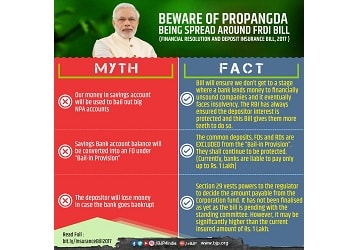
Recently, a bill tabled in Parliament in August - the Financial Resolution and Deposit Insurance (FRDI) Bill 2017 - has been making news due to its controversial ‘bail-in' clauses.
However, important as that clause may be, the other provisions of the Bill are equally so.
The FRDI Bill is part of a larger, more comprehensive approach by the Centre towards systematic resolution of all financial firms - banks, insurance companies and other financial intermediaries.
The Bill comes together with the Insolvency and Bankruptcy Code to spell out the procedure for the winding up or revival of an ailing company.
The need for a specific regulation rose following the 2008 financial crisis, which witnessed a large number of high-profile bankruptcies. With the Centre also actively encouraging people to engage more with the banking sector - both through schemes like Jan Dhan Yojana and moves like demonetisation - it becomes critical to protect savers and those joining the formal economy in case a bank or insurance firm starts failing.
Main Provisions of the Bill- The Bill provides for the setting up of a Resolution Corporation - to replace the existing Deposit Insurance and Credit Guarantee Corporation - which will be tasked with monitoring financial firms, anticipating their risk of failure, taking corrective action and resolving them in case of failure. The corporation is also tasked with providing deposit insurance up to a certain limit yet to be specified, in the event of a bank failure.
- The Corporation will also be tasked with classifying financial firms on their risk of failure - low, moderate, material, imminent, or critical. It will take over the management of a company once it is deemed critical.
- Among other tools, the FRDI Bill also empowers the Corporation to bail-in the company. While a bail-out is the use of public funds to inject capital into an ailing company, a bail-in involves the use of depositors' funds to achieve those ends.
- This can be done either by cancelling the bank's liabilities, or converting them into other forms, such as equity.
- This has caused a lot of concern among depositors who are worried they may lose their hard-earned money deposited with banks.
- However, the fact is that the risk is no more or no less than it ever was.
- The Deposit Insurance and Credit Guarantee Corporation provides deposit insurance of up to Rs.1 lakh. The rest is forfeited in the event of a bank failure.
- The FRDI Bill has not specified the insured amount yet, but it is unlikely to be lower than that amount, as the limit was set way back in 1993.